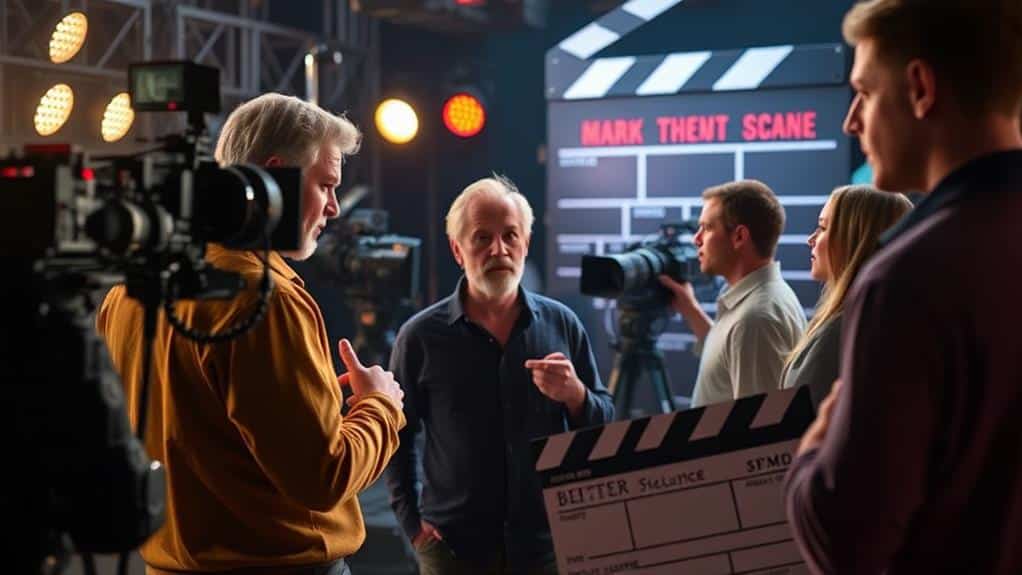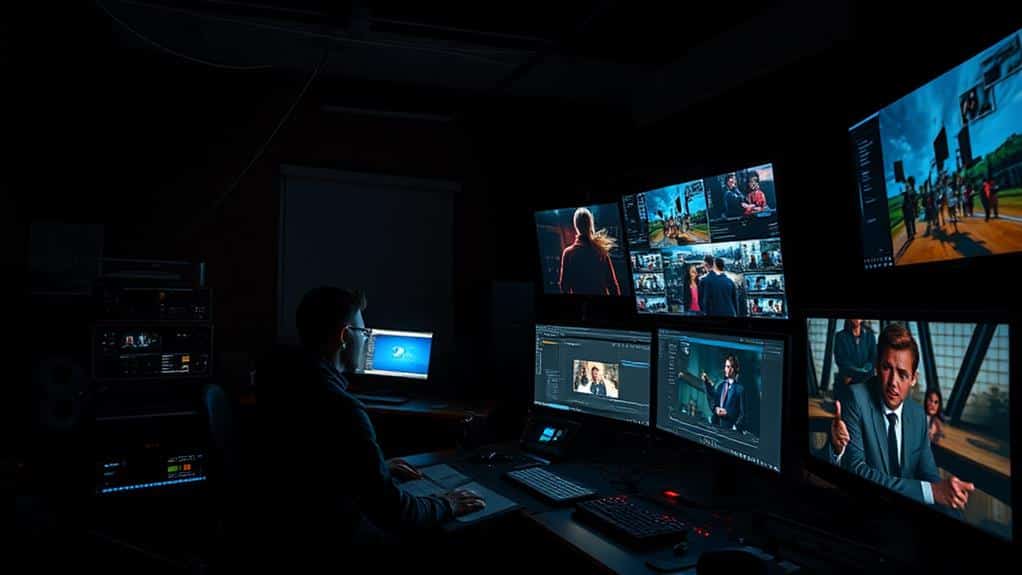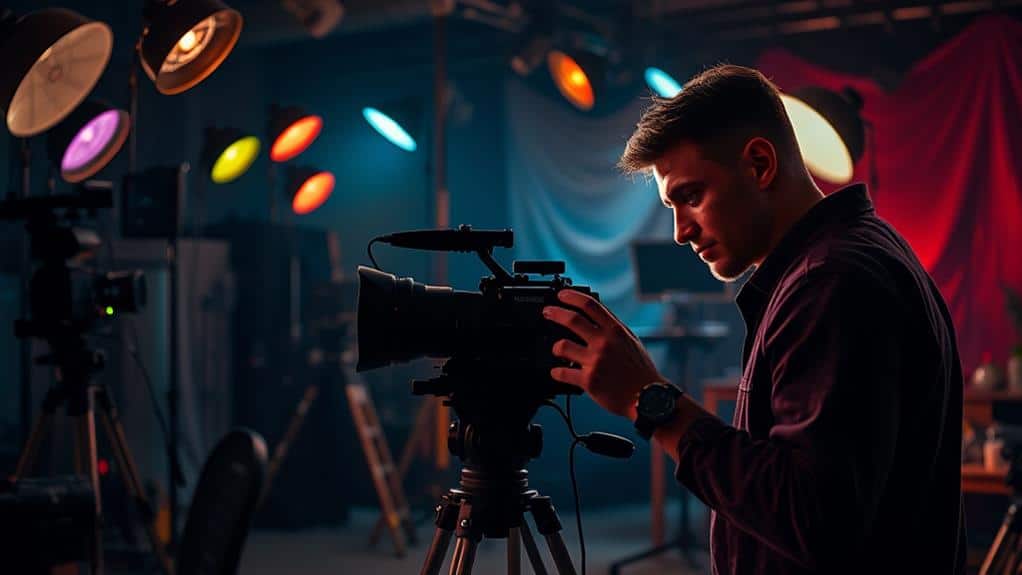Filmmaking is all about teamwork, and knowing five key roles can really spark your interest! First, there's the director, who brings the story to life and works closely with actors. Next, the producer manages the budget and keeps everything on track—imagine juggling flaming chainsaws! Then, the cinematographer captures stunning visuals, making every scene pop. After that, the editor weaves it all together, perfecting the film's rhythm. Finally, the sound designer crafts the auditory experience, making sure you feel every thrill and chill. Each role tackles its challenges, but together, they create the magic you see on screen. Stick around, and you'll discover even more!
Key Takeaways
- The Director is the creative force who translates the script into a visual narrative and collaborates with the film crew.
- The Producer ensures smooth operations, secures financing, manages budgets, and oversees the entire filmmaking process.
- The Cinematographer, or Director of Photography, shapes the film's visual storytelling through camera and lighting decisions.
- The Editor assembles raw footage, maintains continuity, and crafts the film's pacing for an engaging audience experience.
- The Sound Designer creates the auditory landscape, enhancing storytelling through dialogue, ambient sounds, and precise sound editing.
Director

When it comes to filmmaking, the director serves as the primary creative force, translating the script into a compelling visual narrative. Envision stepping onto a set where your artistic vision comes alive!
As a director, you're not just calling the shots; you're collaborating with the entire film crew, from the cinematographers capturing breathtaking visuals to the art team crafting stunning backdrops. Your ability to communicate your creative vision is essential.
Casting is one of your most important tasks. You've got to choose actors who embody your characters and can deliver performances that resonate deeply. It's like assembling a puzzle where every piece matters!
And let's not forget shot composition. Each frame is a canvas, and how you arrange it can drastically change the story's emotion. You'll need those leadership skills to inspire your crew, keeping everyone motivated and focused even when challenges arise.
Directing isn't just about the technical aspects; it's about feeling. Imagine this: you're on set, guiding your actors through a pivotal scene, and you see the magic unfold. It's exhilarating!
You might even find yourself laughing in the middle of a tense moment—what a rush!
In the end, being a director means embracing the chaos, celebrating the creativity, and most importantly, sharing stories that connect with people.
Producer

In the world of filmmaking, the producer acts as the backbone of the entire project, ensuring that everything runs smoothly from start to finish. Imagine standing at the center of a swirling storm of creativity and chaos—that's what a producer does. They're responsible for securing financing, assembling the creative team, and managing budgets and schedules throughout the production process. It's like juggling flaming torches while riding a unicycle!
Producers dive deep into script development too, working closely with screenwriters to refine the story and make sure it fits the vision—and the budget. There are different types of producers, like executive producers, who handle the big bucks and major decisions, and line producers, who manage the everyday operations on set. Picture them as the calm in the eye of the storm, always ready to troubleshoot any issues that pop up.
What's truly fascinating is how the success of a film often hinges on a producer's ability to balance those creative aspirations with the harsh realities of financing. You'll find producers are often the first on set and the last to leave, making sure every detail is just right. They're the glue that holds the whole production together.
Cinematographer
The cinematographer, or Director of Photography (DP), plays a vital role in shaping the film's visual storytelling. Imagine being the artist behind the camera, where every shot composition and lighting choice breathes life into the narrative. You collaborate closely with the director, sharing that artistic vision, to create enchanting visual aesthetics that draw viewers in.
As a cinematographer, you lead the camera and lighting departments, making significant decisions about equipment, angles, and movements. It's a bit like being a conductor of a symphony, where every camera technique you employ—whether using a specific lens or filter—contributes to the overall harmony of the film. Remember, the right lighting can transform a scene from mundane to magical!
Creating a visual narrative is your passion. You choose the film stock or digital settings, and you determine color palettes that set the mood. I once spent hours experimenting with different lighting setups, and it taught me how much impact a single light can have. It's both challenging and rewarding!
But your job doesn't end with filming. You still collaborate during post-production with the editor and colorist to guarantee those stunning visuals align with your vision. Think of it as polishing a gem to make it shine even brighter.
Editor

Cutting together a film's story requires not just skill but an innate understanding of narrative rhythm. As an editor, you're the architect of the film's pacing, shaping how the audience experiences the journey. You work closely with the director, crafting the footage into a cohesive narrative that captivates viewers from start to finish.
Here are a few key responsibilities of an editor:
- Assembling raw footage into a polished final product
- Ensuring continuity and visual coherence across scenes
- Integrating sound design and visual effects for emotional impact
In post-production, you wield specialized software like Adobe Premiere Pro or Avid Media Composer, cutting and arranging scenes while focusing on storytelling. You'll deal with hundreds of hours of footage, making decisions that can trim it down to a sleek 90-120 minutes.
Your role is essential in maintaining color correction and grading, ensuring every scene looks stunning and consistent.
You're not just working with visuals; you're also enhancing the film's emotional depth. By integrating sound design and music, you create a rich tapestry that pulls audiences into the story.
It's a challenge, but when you see your work on the big screen, it's all worth it.
Sound Designer

Sound designers play an essential role in crafting a film's auditory landscape, shaping everything from dialogue to ambient sounds. Imagine watching a thrilling scene without the heart-pounding sound effects or the subtle whispers of the wind—it's not quite the same, right?
As a sound designer, you get to collaborate closely with the director and sound mixer, blending various audio elements to guarantee the sound enhances the visual storytelling. It's like adding spices to a dish; the right mix can elevate the entire experience.
In your toolkit, you'll likely find digital audio workstations (DAWs) like Pro Tools or Logic Pro, which let you edit and manipulate sound recordings with precision. You might plunge into location sound recording, capturing authentic sounds right where the action happens.
Plus, there's the fun of Foley artistry—creating unique sound effects in post-production that can make or break a scene.
Your work is critical for the film's emotional impact. Think about it: the right sound can make an audience jump, laugh, or feel a deep connection to a character.
Studies show that effective sound design greatly influences audience engagement and perception. So, when you're piecing together those audio elements, remember it's not just about filling the silence; it's about creating an experience that resonates.
Embrace the challenge, and let your passion for filmmaking shine through every auditory detail!
Frequently Asked Questions
Who Are Five Key People Roles Involved in Making a Movie?
When you plunge into making a movie, you'll meet a few essential folks who keep everything flowing.
First, there's the producer, who juggles the money and schedules.
Then, the director shapes the film's heart and soul.
Don't forget the screenwriter, crafting the story that hooks you.
The director of photography makes it look stunning, while the casting director finds the perfect actors.
Each role's like a puzzle piece, fitting together to create magic on screen!
What Are the 4 Pillars of Filmmaking?
Imagine standing on a bustling film set, surrounded by creativity and energy. The four pillars of filmmaking are your guiding stars.
First, there's pre-production, where you dream up your story and gather your team.
Next comes production, the thrilling moment you capture your vision on camera.
Afterward, in post-production, you weave your footage into a masterpiece.
Finally, distribution gets your film out to the world, letting your story shine.
It's an exciting journey!
Who Is the Most Important Role in a Film?
When you immerse yourself in filmmaking, it's tough to pick just one significant role. The director's often seen as the heart of the film, guiding the vision.
But don't forget about producers! They're like the glue holding everything together.
The screenwriter crafts the story, while the director of photography brings it to life visually.
Each role is essential, and without one, the magic of filmmaking might just fizzle out like a bad soda!
What Is the Most Important Job in Film Making?
You might think the most important job in filmmaking is the director, but every role matters.
Think about the screenwriter crafting those memorable lines or the casting director finding the perfect actors.
When you immerse yourself in filmmaking, you'll realize it's all about teamwork. Each person's passion shapes the final product.
Remember, it's like a puzzle; every piece counts, and without one, the picture just doesn't come together.
Conclusion
So, whether you dream of directing a heart-stopping thriller or crafting the perfect soundscape, remember that every role in filmmaking is like a piece of a puzzle. Each person's passion and effort come together to create magic on screen. I've faced my share of challenges—like that time my laptop crashed before a big edit! But it's all part of the journey. Immerse yourself in the world of film, and you might just find your voice shining bright!




